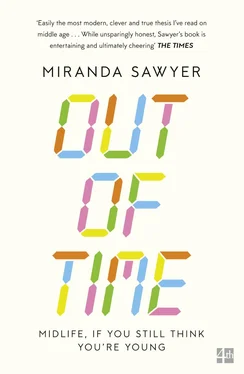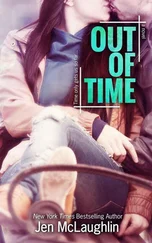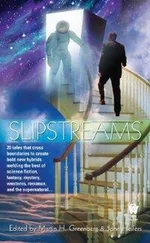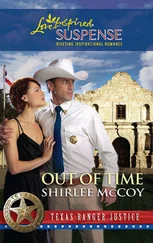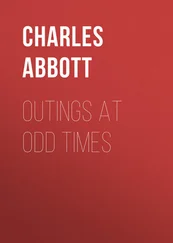These are the facts. I am in my forties. I have a job. I am married. We have children and a flat with no garden, and a mortgage and a fridge-freezer and a navy blue estate car. None of this is a surprise. Is it?
Except … a mood can gradually take over, change the way you feel about the facts. Warp them into something different. You know how it is to fall out of love with someone? How the simple reality of them walking into a room, or the way their teeth clink on a mug as they drink their tea can make you hate everything about them, even though they are the very same person you once found so bewitching? I did not feel this about my husband. I was wondering if I felt it about myself. About my life, and who I had become.
There were other feelings. A sort of mourning. A weighing up, while feeling weighed down. A desire to escape – run away, quick! – that came on strong in the middle of the night.
But the main feeling I had came in the form of a moving picture, a repeat action. I am standing in a river, the water flowing, cold and silver, bubbling and churning around my feet. It’s lovely, really lovely, and I’m plunging my hands in, over and over, trying to catch something. Have I dropped it? Is it a ring? Or was it a fish I wanted?
No. It’s the water itself. It’s so beautiful. I want to hold it in my palms, bring it up close, clutch it to my heart. I want to stop it rushing past me so fast.
A crisis sounds so thrilling. A breakdown. A revolution. A sudden change, institutional collapse. Something dramatic.
One that happens in your forties? Hmm. Less so. We all know what that is. We see the outward gesture – the new car, the extreme haircut, the unusually positioned piercing – and we smile. We patronize. Look how silly he is, in his baseball cap, on his motorbike, with his new lover on his arm. Not dashing, not carefree, not youthful. Sad. And see her, with her tragic attempts to slow time, the clothes that are too young for her, the organic diet, the new lips. Ridiculous. Laughable.
Under the showiness of the exterior, there is a change within. All the stuff we see, no matter how clichéd: that’s just telling the world.
No show, here, however. I wasn’t running off with a Pilates expert. I didn’t blow thousands on a trip to find myself. I didn’t even get a shit tattoo. There was nothing to witness. From the outside, all remained the same. Work, kids, marriage, mortgage, blah. The facts didn’t change.
If the crisis seeps in, if the start is silent, you need a jolt to realize it. Having F was my jolt.
Our second child, she arrived late (five years after P, our son), a quarter-year before I turned 44. S and I knew we were very lucky. No matter what age you are when you have children, if they are healthy, you are lucky; and no matter what age you are when you have children, their arrival makes you feel young and old at the same time. The difference is, if you have them in your forties, the old part is more of a head-nag.
The jolt. I can pinpoint it. It happened one day when I was in the kitchen, working on my laptop. F was only a few months old. She was a good baby, cheerful and self-contained. She liked her bouncy chair and I would put it on the kitchen floor so we could smile at each other as I wrote. I typed, the washing machine spun, she bounced and grappled with a toy monkey called Monkey. All was serene. We were happy in our tiny life.
I looked at her as I wrote and I thought, You are amazing.
And then I thought, By the time you’re 18, I will be over 60.
I stopped writing.
I thought, When you’re 18, I will just about have the strength to push you out of the front door and into your adult life before I have to check into an old people’s home.
I thought, What about university fees? What if you don’t leave home completely, and want to move in again? We’ll need to sell the flat to get the money for the old people’s home.
Then I thought: If I’m tired now, that is nothing compared to how knackered I’m going to be dealing with two teenagers in my mid to late fifties. Plus, I still have all these things I need to do! Like … well, I don’t know. But things that are important for me and my development. Also, we really need to get the front gate mended.
I looked at F and she looked at me, smiling, kicking her legs. She said, ‘De du da de du,’ and twisted her hands in front of her as though she were changing channels on a 1980s TV. I thought: That’s an old-school motion right there. Then I thought: You’re showing your age.
What F made me realize was that I was over halfway through. At 40, I could still convince myself that, with a decent diet and some luck when crossing the road, I could well have more than forty years to go. It’s a lot harder to do that at 44.
I looked at F and I suddenly knew – really knew – that I had less time to go than I had already lived. That the time I had was a limited resource, that life was an astonishing gift and both were diminishing every day.
Lots of people get weird around this age, I did realize that. If you don’t get Fear of Forty, then Fear of Fifty will do it. The Fear: of everything that you have become, and everything you have not.
Eugene O’Neill, in A Long Day’s Journey Into Night , wrote: ‘None of us can help the things life has done to us. They’re done before you realize it. And once they’re done, they make you do other things until at last everything comes between you and what you’d like to be and you’ve lost your true self for ever.’
(What has life done to me? What have I done? What would I like to be?)
Victor Hugo wrote this: ‘Forty is the old age of youth; 50, the youth of old age.’
I thought about this a lot. So what happens in those ten years in between? And who wants to be a young old person? Even though that is all we ever are?
I’d had my jolt. I’d clocked my unmarked midpoint; I knew that time was running out … But what to do about it? Life is busy in your forties, whether or not you have children. It’s hard to keep everything tied down. Most days, I felt like Dorothy in The Wizard of Oz when the twister hits and the house goes up, gazing out of the window as essential parts of her life whirl past. Her family, her friends, adversity (witchy Miss Gulch on the bike), livelihood (the cow – all out of control, spiralling towards the future, out of Dorothy’s reach and remit. She can’t help them, though she knows she must.
That is how my life is in middle age. So many people to take care of, so many jobs to do. A lot to catch and tether, and who can grab hold of anything when all the important bits are constantly in motion? Round and round, faster and faster. Are we moving forward or just spinning on the spot?
What I really wanted was for everything to stop, for the house to land, with me still inside. I wanted to arrive in a sunlit place, to be celebrated as a new magical queen, and to have the time to enjoy it. A place made of sweets, where the small people who surrounded me – let’s call them my children – all sang in tune and did what I told them to. Also, that when I landed, I’d crush the life out of my enemy, whoever my enemy is. That would be brilliant. Splat, gone, byeee. Gimme your shoes. And when you die, I can have your shoes that are sparkly.
Now that F is no longer a baby, she talks about death all the time. She kicks it around in her head, riffs on it to delay me putting her to bed. She doesn’t want to go to bed. Too much to do, and she’s scared of the dark (of death). She talks about death as though it’s a cool result. To her death has glamour, because it’s frightening and exotic and it won’t happen.
The idea of death. In your teenage years, your twenties, it becomes an existential concept. Actually, it can be a comfort: nothing matters, because we’re all going to die anyway. We’re all going to die, so what’s the point in learning quadratic equations, or cleaning under the bed?
Читать дальше
